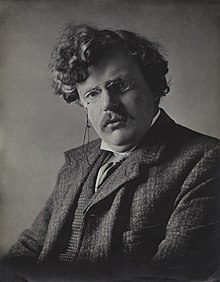G. K. Chesterton | |
|---|---|
 Chesterton in 1909 | |
| Born | Gilbert Keith Chesterton 29 May 1874 Kensington, London, England |
| Died | 14 June 1936 (aged 62) Beaconsfield, Buckinghamshire, England |
| Resting place | Roman Catholic Cemetery, Beaconsfield |
| Occupation |
|
| Education | University College London |
| Period | 1900–1936 |
| Genre | Essays, fantasy, Christian apologetics, Catholic apologetics, mystery, poetry |
| Literary movement | Catholic literary revival[1] |
| Notable works | |
| Spouse | |
| Relatives |
|
| Signature | |
 | |
Gilbert Keith Chesterton KC*SG (29 May 1874 – 14 June 1936) was an English author, philosopher, Christian apologist, and literary and art critic.[2]
Chesterton created the fictional priest-detective Father Brown,[3] and wrote on apologetics, such as his works Orthodoxy and The Everlasting Man.[4][5] Chesterton routinely referred to himself as an orthodox Christian, and came to identify this position more and more with Catholicism, eventually converting from high church Anglicanism. Biographers have identified him as a successor to such Victorian authors as Matthew Arnold, Thomas Carlyle, John Henry Newman and John Ruskin.[6]
He has been referred to as the "prince of paradox".[7] Of his writing style, Time observed: "Whenever possible, Chesterton made his points with popular sayings, proverbs, allegories—first carefully turning them inside out."[4] His writings were an influence on Jorge Luis Borges, who compared his work with that of Edgar Allan Poe.[8]
| Part of a series on |
| Catholic philosophy |
|---|
   |
- ^ Ker, Ian (2003). The Catholic Revival in English Literature (1845–1961): Newman, Hopkins, Belloc, Chesterton, Greene, Waugh. University of Notre Dame Press.
- ^ "Obituary", Variety, 17 June 1936
- ^ O'Connor, John (1937). Father Brown on Chesterton (PDF). Frederick Muller Ltd. Archived (PDF) from the original on 3 April 2013. Retrieved 7 April 2013.
- ^ a b "Orthodoxologist", Time, 11 October 1943, archived from the original on 20 November 2009, retrieved 24 October 2008
- ^ Douglas 1974: "Like his friend Ronald Knox he was both entertainer and Christian apologist. The world never fails to appreciate the combination when it is well done; even evangelicals sometimes give the impression of bestowing a waiver on deviations if a man is enough of a genius."
- ^ Ker 2011, p. 485.
- ^ Douglas, J. D. (24 May 1974). "G. K. Chesterton, the Eccentric Prince of Paradox". Christianity Today. Archived from the original on 1 November 2014. Retrieved 8 July 2014.
- ^ Chesterton, Gilbert Keith (2002). Čovjek koji je previše znao (in Croatian). Translated by Darko Mitin. Zlatar: Partenon. p. 134. ISBN 953-6840-03-0.